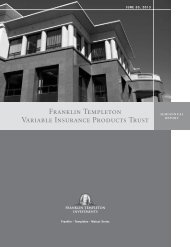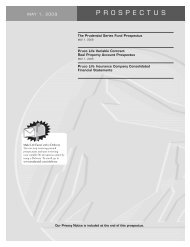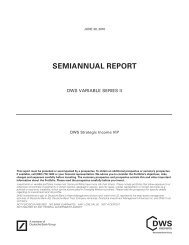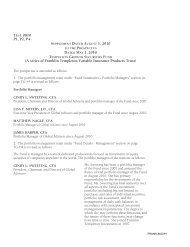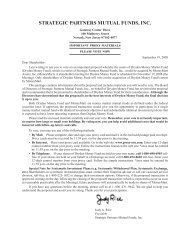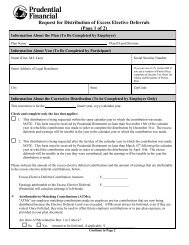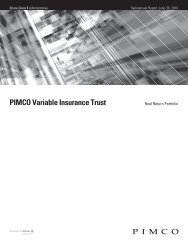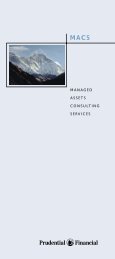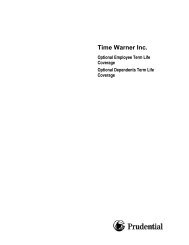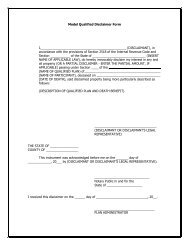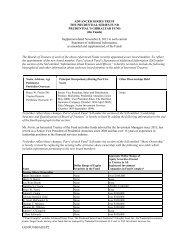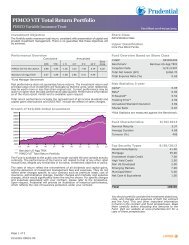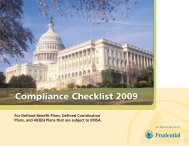Advanced Series Trust AST Academic Strategies Asset ... - Prudential
Advanced Series Trust AST Academic Strategies Asset ... - Prudential
Advanced Series Trust AST Academic Strategies Asset ... - Prudential
Create successful ePaper yourself
Turn your PDF publications into a flip-book with our unique Google optimized e-Paper software.
Reverse Repurchase Agreements. Each Portfolio may use reverse repurchase agreements, where the Portfolio sells a security with an<br />
obligation to repurchase it at an agreed-upon price and time.<br />
Dollar Rolls. Each Portfolio may enter into dollar rolls.<br />
Bank Loans. Each Portfolio may invest in bank loans. Bank loans include fixed and floating rate loans that are privately negotiated<br />
between a corporate borrower and one or more financial institutions, including, but not limited to, term loans, revolvers, delayed<br />
draw loans, synthetic letters of credit, and other instruments issued in the bank loan market. Each Portfolio may acquire interests in<br />
loans directly (by way of assignment from the selling institution) or indirectly (by way of the purchase of a participation interest from<br />
the selling institution). Under a bank loan assignment, a Portfolio generally will succeed to all the rights and obligations of an<br />
assigning lending institution and becomes a lender under the loan agreement with the relevant borrower in connection with that<br />
loan. Under a bank loan participation, the Portfolio generally will have a contractual relationship only with the lender, not with the<br />
relevant borrower. As a result, a Portfolio generally will have the right to receive payments of principal, interest, and any fees to<br />
which it is entitled only from the lender selling the participation and only upon receipt by the lender of the payments from the<br />
relevant borrower.<br />
When-Issued and Delayed-Delivery Securities. Each Portfolio may purchase securities, including money market obligations or other<br />
obligations on a when-issued or delayed-delivery basis.<br />
Money Market Instruments. Each Target Maturity Portfolio may invest in money market instruments, including commercial paper of a<br />
U.S. or foreign company, foreign government securities, certificates of deposit, bankers’ acceptances, time deposits of domestic and<br />
foreign banks, and obligations issued or guaranteed by the U.S. government or its agencies. These obligations may be U.S. dollardenominated<br />
or denominated in a foreign currency.<br />
TRACERS and TRAINS. Tradable Custodial Receipts or TRACERS represent an interest in a basket of investment grade corporate<br />
credits. Targeted Return Index Securities or TRAINS represent an interest in a basket of high yield securities of varying credit quality.<br />
Interests in TRACERS and TRAINS provide a cost-effective alternative to purchasing individual issues.<br />
Yankee Obligations. As set forth above, each Portfolio may invest up to 50% of its total assets in Yankee obligations. Yankee<br />
obligations are U.S. dollar-denominated debt securities of foreign corporations issued in the United States and U.S. dollardenominated<br />
debt securities issued or guaranteed as to payment of principal and interest by governments, quasi-governmental<br />
entities, government agencies, and other governmental entities of foreign countries and supranational entities, which securities are<br />
issued in the United States. Debt securities of quasi-governmental entities are issued by entities owned by either a national, state, or<br />
equivalent government or are obligations of a political unit that is not backed by the national government’s full faith and credit and<br />
general taxing powers.<br />
Additional <strong>Strategies</strong>. Each Target Maturity Portfolio follows certain policies when it borrows money (each Target Maturity Portfolio<br />
can borrow up to 33 1/3% of the value of its total assets); lends its securities to others (each Target Maturity Portfolio can lend up to<br />
33 1/3% of the value of its total assets); and holds illiquid securities (each Target Maturity Portfolio may invest up to 15% of its net<br />
assets in illiquid securities, including securities with legal or contractual restrictions on resale, those without a readily available<br />
market and repurchase agreements with maturities longer than seven days). The Subadviser will seek to maintain an adequate level of<br />
portfolio liquidity for each Target Maturity Portfolio, based on all relevant facts and circumstances, with consideration given to a<br />
Target Maturity Portfolio’s exposure to illiquid securities in the event the market value of such securities exceeds 15% of the Target<br />
Maturity Portfolio’s net assets due to an increase in the aggregate value of its illiquid securities and/or a decline in the aggregate value<br />
of its other portfolio securities. Each Target Maturity Portfolio is subject to certain other investment restrictions that are fundamental<br />
policies, which means they cannot be changed without shareholder approval. For more information about these restrictions, please<br />
see the SAI.<br />
<strong>AST</strong> Cohen & Steers Realty Portfolio<br />
Investment Objective: to maximize total return through investment in real estate securities.<br />
Principal Investment Policies:<br />
The Portfolio will have a non-fundamental policy to invest, under normal circumstances, at least 80% of the value of its net assets in<br />
securities of real estate related issuers. The Portfolio pursues its investment objective of maximizing total return by seeking, with<br />
approximately equal emphasis, capital growth and current income.<br />
Generally, the equity securities of real estate related issuers will consist of:<br />
218



